Which pet behaviors warrant an emergency trip?
You can always call your local emergency vet for advice if you’re uncertain. If your pet has been in accident, suffered serious injury or is experiencing any of these concerning symptoms, they will need emergency care immediately:
- They have ingested a toxic or poisonous substance (anything from chocolate to antifreeze, rodent poison, etc.)
- Unconsciousness
- Heat stress or heatstroke
- Difficulty breathing, extended gagging, choking or coughing
- Severe or ongoing bleeding
- Definite signs of pain or extreme anxiety
- Limping, broken bones or inability to move legs
- Seizures and/or staggering
- Pale gums (gums should be pink in color, not blue, yellow or gray)
- Fever
- Severe vomiting or diarrhea (more than two episodes in 24 hours)
- Straining to urinate
There is a long list of symptoms that need the care and attention of an emergency vet, but these are among the most serious.
Steps to Take in an Emergency
Finding yourself dealing with a suddenly sick or injured pet can be intensely distressing, but remaining calm and checking the following boxes will help you keep a cool head.
Prepare
The best time to prepare for an emergency is before it happens, but accidents do occur. During a regular visit, ask your vet if they offer 24/7, after hours emergency care or request a recommendation. You can also fill a first aid kit with essential items and have emergency phone numbers for your vet and emergency clinic or facility easily accessible.
Bonus: Make a test run to your emergency vet or facility so you know exactly where it is and how long it takes.
Google is also your friend. Google “Emergency vet near me” or “24 hour vet near me”. Bookmark the results.
Assess
Although your vet will have seen cases that could have waited until morning, if you are unsure it’s best to err on the side of caution. Take a deep breath and look for symptoms noted above.
Make the Call
Google/call an emergency vet near you right away. Follow their instructions, administer any recommended first aid and advise them that you’re on your way.
Stabilize and Transport
Take care around your furry friend and approach them cautiously. When they are injured, anxious or in pain, they may react out of fear and cause you injury or harm. If they show aggression, back away and call for help. Otherwise, create a makeshift stretcher (for dogs) or use an open-topped box (for cats) to transport them, ensuring you support their head and neck.
For after hours emergencies for cats, dogs and small pets in the Cordova and greater Memphis areas, we recommend you go to Animal Emergency Center at 3767 Summer Avenue in Memphis (open evenings, weekends and holidays) or Memphis Veterinary Specialists & Emergency at 555 Trinity Creek Cove in Cordova (open 24/7/365).
Wondering if you should see an emergency vet? Contact our After Hours Emergency partners.
Looking for a vet in Cordova and greater Memphis area?
We're always accepting new patients, so contact our veterinary hospital today to book your pet's first appointment.
Related Articles View All
Cats & Colds: Can They Get Them & What To Do?
Many people don't know that our cats can get sick, but they can catch colds just like we can! A cat with a cold will display similar symptoms as humans do such as sneezing and a runny nose. Here, our Cordova vets talk about the causes of cat colds and when to seek veterinary care.
Do cats get depressed?
Cats are known for their independent yet playful characters. So, if your cat seems sad, you're bound to be concerned. Today, we discuss signs of depression in cats, potential causes of cat depression, and what can be done to help your feline friend banish the blues.
My cat sleeps constantly, should I be worried?
No doubt about it, cats love to sleep. But how much is too much? Today, you will discover reasons why cats sleep so much and learn when to be concerned about your cat's sleeping habits.
What To Do If Your Cat or Dog Having Difficulty Breathing
Does your cat or dog's panting mean that they're having breathing difficulties? Today, our Cordova vets look at breathing difficulties in dogs and cats, and how they are treated.

